
No Spiritual Flabbiness

Stay clear of silly stories that get dressed up as religion. Exercise daily in God—no spiritual flabbiness, please! Workouts in the gymnasium are useful, but a disciplined life in God is far more so, making you fit both today and forever. I Timothy 4:7-8 MSG
This passage of scripture really caught my eye because of its lightheartedness but it rings with essential truth. Let’s take a look at a few statistics, always with a subjective eye, because we know that everything we read on the internet has to be “true”.
 According to one site, roughly a third of Americans have a gym membership costing anywhere from $30 to $90 per month but here’s the good part, only about half set foot in the gym twice a week and many make a token appearance now and then just to say, “I went to the gym today,” to a friend or business acquaintance. And here’s a good one, Americans spend $1.3 billion annually on unused memberships.
According to one site, roughly a third of Americans have a gym membership costing anywhere from $30 to $90 per month but here’s the good part, only about half set foot in the gym twice a week and many make a token appearance now and then just to say, “I went to the gym today,” to a friend or business acquaintance. And here’s a good one, Americans spend $1.3 billion annually on unused memberships.
In 2019, adults spent $34.8 billion on gym memberships, but that number fell to $8.2 billion in 2020 because of the pandemic. Many people turned to outdoor activities rather than spending time in crowded places. They also invested in home exercise equipment but again quickly lost interest and either sold the equipment or shoved it into a corner of the garage and buried it under all the other unused purchases acquired during that time of quarantine and no longer considered necessary.
Though I have never owned a gym membership, I must confess to purchasing a stationary bike during the pandemic, and it has seen quite a bit of use. But walking has always been our preferred form of physical exercise along with hiking when we’re able to get to trails. We’ve also enjoyed biking until very recent years. Actually, Ken still does but my biking days are over.
Of course, one reason the topic of exercise caught my attention is that I am currently engaged in a physical therapy program requiring two visits each week with a professional and a daily home workout performing prescribed movements targeting specific muscle groups that will hopefully remove some of the stress from a weakened lower spine. Some days I’m ready to get on the floor and run through my paces but others I’d rather sit in my recliner and let someone else do it for me. Whether or not I want to do the workout, I know I must if I want to have any hope of strengthening my body to feel better.
Wouldn’t it be nice if we put as large a time investment into spiritual exercise as we do monetary investment into the physical development of our bodies? I wanted to look at another version of our focus verse and chose the NLT which says:
Do not waste time arguing over godless ideas and old wives’ tales. Instead, train yourselves to be godly. Physical training is good, but training for godliness is much better, promising benefits in this life and in the life to come. I Timothy 4:7-8 NLT
It’s not as much fun as the Message interpretation and it might not have snagged my attention as quickly, but it clearly articulates our instructions for life. Almost anything worth doing requires some advanced thought and planning. If you’re going on vacation, you’ll likely check on lodging options, nearby restaurants, and interesting things to see or do. If traveling by car, you may want to have it checked over before leaving and make yourself aware of driving regulations along your route.
To ensure a healthy garden, you’ll need to know the soil, light, and moisture requirements of each plant. It’s important to make sure different varieties play well together before planting them next door to one another. Some will grow from seed and bloom in a single season while others will need a season or two to reach maturity. In short, we must train ourselves for the tasks we want to accomplish. When interviewing for a new job, it’s important to study the potential employer to find out if they are aligned with your values. You must also be prepared to present yourself in a positive light. And you surely wouldn’t go out for the football team if you’ve never played the game. It’s important to know the game well and, certainly, to prepare your body for the rigors it will experience.
We all take enormous quantities of time preparing for and agonizing over nearly everything we do, but when it comes to spiritual training, we seem to just cruise along thinking some miraculous understanding will overtake us and we’ll be perfect humans. People, we need to immerse ourselves in the only training that will offer us eternity. Don’t get me wrong, planning and preparedness are wonderful and necessary attributes, but training to be godly people should take priority over all else. Dive right into your Bible, open a dialog with God, and do your best to emulate the example set by Jesus.
we seem to just cruise along thinking some miraculous understanding will overtake us and we’ll be perfect humans. People, we need to immerse ourselves in the only training that will offer us eternity. Don’t get me wrong, planning and preparedness are wonderful and necessary attributes, but training to be godly people should take priority over all else. Dive right into your Bible, open a dialog with God, and do your best to emulate the example set by Jesus.
As for my very boring physical therapy workout, I’ll keep slugging it out because I really want to strengthen my muscles so that I can continue to enjoy those new flowers I planted before this little detour of mine began. And here’s the thing, training for anything can be whatever you make it. You can whine and complain (which I admit to doing now and again) or you can approach any training with your whole heart and a bundle of enthusiasm. The latter will always bring sweet rewards. I’m pretty sure my days of strenuous hiking have gone the way of my beloved bicycle, but I trust I’ll still be able to handle level terrain and tackle those relentless weeds, and look for new adventures. They may just have to be a little easier on the old bones. And I’ll always have time to train my wayward spirit in the way it should go.
This is a trustworthy saying, and everyone should accept it. This is why we work hard and continue to struggle, for our hope is in the living God, who is the Savior of all people and particularly of all believers. I Timothy 4:9-10 NLT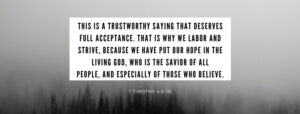
Read more...
Accepting Truths
Bear one another’s burdens…Galatians 6:2a
There are times when life can best be described as a roller coaster ride, full of exciting twists and turns, beautiful views from the mountain tops, and the rush of adrenaline when being plunged into a waiting abyss. And sometimes that abyss turns out to be something much different than we’d planned. Such has been my fate this past week. If you read last week’s article, you heard me describe gorgeous mountain vistas, sparkling streams, and visits with some of nature’s four-legged critters, but you weren’t privy to the other side of the coin.
 On the last morning of our wonderful camping trip, I bent to pick up an item from the floor when something resembling a lightning bolt began at my hip and coursed downward through my thigh and calf, exiting my body at my toes. The pain was sharp and intense. The whole experience lasted maybe a couple of seconds but left me feeling as if I’d been through a major storm. When I tried to put weight on the leg, it trembled so hard, I feared I would fall. With Ken doing the bulk of it, we managed to pack everything without further incident. I took a pain reliever and prepared for an uncomfortable drive home. It wasn’t as bad as I’d expected but I must admit, I was grateful to arrive home and find two inches of rain in the gauge, eliminating the need to water our landscape areas.
On the last morning of our wonderful camping trip, I bent to pick up an item from the floor when something resembling a lightning bolt began at my hip and coursed downward through my thigh and calf, exiting my body at my toes. The pain was sharp and intense. The whole experience lasted maybe a couple of seconds but left me feeling as if I’d been through a major storm. When I tried to put weight on the leg, it trembled so hard, I feared I would fall. With Ken doing the bulk of it, we managed to pack everything without further incident. I took a pain reliever and prepared for an uncomfortable drive home. It wasn’t as bad as I’d expected but I must admit, I was grateful to arrive home and find two inches of rain in the gauge, eliminating the need to water our landscape areas.
Overnight, however, the pain became worse and when I tried to put weight on the foot, it was pure agony. This continued for two more days, and we determined that I needed to see a doctor. An examination convinced the Physician’s Assistant that I was likely experiencing a pinched nerve and x-rays verified that I had compressed vertebrae that were causing the pinch but, thankfully, no broken bones. The steroid shot I was given relieved my hip pain, but the foot continued to hurt. The PA referred me to Physical Therapy which commenced with my evaluation on Friday. For the weekend, I completed my “homework” exercises and am scheduled for two sessions with the therapist this week and several more similar weeks as we move through summer.
The words to the song, Everlasting God, have been my constant companion this week. Beginning with, Strength will rise as we wait upon the Lord, and then on to the chorus;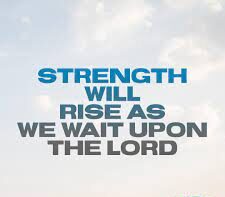
You are the everlasting God, the everlasting God,
You do not faint; you won’t grow weary.
You’re the defender of the weak, You comfort those in need,
You lift us up on wings like eagles.
I can tell you that patience is not a virtue of mine and I am not good at convalescing. I detest being slowed down and prevented from doing the things that comprise my daily life. I have just reworked my front landscape bed and it needs my TLC. My house needs attention after the flurry of packing to go camping and my inability to address those issues on our return. We managed to replenish our grocery stock, but I really wanted to plan another camping trip.
As you’ve likely surmised, my body said an emphatic “no!”
But you know what? When I arrived at the Physical Therapy facility, I saw people with much worse problems than mine. When talking with friends we learned that they, also, had serious issues to deal with. In reality, I have plenty to do from the relative comfort of my recliner. I have lots of friends and acquaintances to pray for as well as requests on our prayer list from some people that I know and others that I don’t. But all their issues are important. So, I got busy talking to God about all those needs and writing for the Gatepost, and catching up on all my resource typing and time began to pass more quickly. You see, unlike many of those on my prayer list who experience pain all the time, as long as I’m propped up in my recliner, I feel minimal pain. It’s only when I walk that I hurt. Of course, the physical therapist says I have to keep my muscles moving without overdoing it, so I “walk” a fine line.
 When troubles of any kind come your way, consider it an opportunity for great joy. For you know that when your faith is tested, your endurance has a chance to grow. James 1:2-3
When troubles of any kind come your way, consider it an opportunity for great joy. For you know that when your faith is tested, your endurance has a chance to grow. James 1:2-3
I guess God was telegraphing a message the old-fashioned way that I needed to slow down, be grateful for my blessings, take time to recognize the needs of others, and exercise patience in letting my own body heal. I also need to express my gratitude to those who have gone out of their way to help me, most importantly my caring husband and a great neighbor. We all need a little or a lot of help from time to time. I’m grateful it has been there for me, and I’ll need to pay it forward when I’m feeling stronger. For now, I’ll do the very best thing that any of us can do for those who have special needs…PRAY! And the Lord has seen to it that I have plenty of time for that!
Then you will call upon me and come and pray to me, and I will hear you. Jeremiah 29:12
Read more...

A Week-End Trek on the Wild Side

In his hand is the life of every creature and the breath of all mankind. Job 12:10
 As I write we are just returning home from a five-day camping trip at Devil’s Den State Park just south of Fayetteville, AR. It was a very impromptu event precipitated by reservations our daughter’s family had made months ago. We had discussed the possibility of joining them, but spring allergies and a number of competing projects pushed those plans aside until I mentioned that the kids were headed down this weekend. Ken was ready to go. We checked the website for available sites and found an opening for Wednesday and Thursday nights but not the weekend….no big surprise there. The kids were going on Thursday so we could have a day with them and one to ourselves which is a pretty nice arrangement and, if we were lucky, maybe someone would cancel a weekend reservation.
As I write we are just returning home from a five-day camping trip at Devil’s Den State Park just south of Fayetteville, AR. It was a very impromptu event precipitated by reservations our daughter’s family had made months ago. We had discussed the possibility of joining them, but spring allergies and a number of competing projects pushed those plans aside until I mentioned that the kids were headed down this weekend. Ken was ready to go. We checked the website for available sites and found an opening for Wednesday and Thursday nights but not the weekend….no big surprise there. The kids were going on Thursday so we could have a day with them and one to ourselves which is a pretty nice arrangement and, if we were lucky, maybe someone would cancel a weekend reservation. 
Our camper was thoroughly cleaned, inside and out, and felt we were ready for anything. The night before leaving, we lost car keys, well, at first we thought it was RV keys. It’s a very long story that I won’t take the time to tell, but we finally accounted for all of our keys and, as usual, I was the culprit who lost them. Because of the key debacle, we were delayed in loading all our gear and prepping food, but we finally managed to get it all done and were on the road by noon on Wednesday. We didn’t know what to expect on arrival because when I checked radar that morning the area around the park had been under a severe thunderstorm warning.
Do you know how God controls the clouds and makes his lightning flash? Do you know how the clouds hang poised, those wonders of him who has perfect knowledge? Job 37:15-16
On arrival, we discovered considerable damage and learned from the locals that the hail they experienced was softball sized. The bad news for us was more rain was forecast for that night. Fortunately, it wasn’t expected to be severe. We checked for weekend cancellations and found there were none so we proceeded to our site to settle in and, as luck would have it, ours was the only site in the entire campground with literally no shade. Strike one! Also, the park is quite remote and off the grid. There is no cell service and WiFi is only available in two areas, neither being close to the campground. In order to drive anywhere, we have to unhook everything and re-establish all our connections on return. Choice number two…walk and the trail is pretty steep. Strike two! We learned pretty quickly that we had a leak in our water lines, so we had to switch to the holding tank and pump system, not the best scenario when you’re expecting full hook-ups. Strike three! By then, I was getting pretty discouraged.
Because of the heat and no shade at our site, we abandoned our plan to cook over the campfire and made cold sandwiches and lots of fresh fruit for dinner. I was beginning to think we should have stayed home. But, after our simple dinner, we took a walk and happened on a family playing wonderful music. They were Mom, Dad, five kids, and Grandpa who played a variety of instruments and sang together. As we stood outside their site and listened, they invited us in. Before long, others were invited to join the group. We listened to the likes of Country Roads, Take Me Home, The Goodness of God, Jolene, and many others. Sometimes we joined in the singing and sometimes we just listened. Our hosts were lovely folks, kind and generous, including anyone who was looking for a little fun and good fellowship. One of their guests turned out to be a park superintendent and we asked him to keep an eye open for a site cancellation.
The next afternoon, the other superintendent came calling with news of an available site. As a matter of fact, we could move right in, and it had the extra bonus of plentiful shade. We moved and were all set up again not long before the kids arrived. That night we indulged in bubbly Dutch oven peach cobbler and a great visit with the kids plus more music at the neighbor’s site. It rained overnight and during the morning hours on Friday, so we just hung out until the weather cleared and then did a short hike that tours the old CCC camp located in the park. If you’re not familiar, CCC, Civilian Conservation Corps, was a government program of the 1930s that provided employment for men aged 17-28 and utilized their skills to improve parks all over our nation. Remnants of their work exist today  in numerous parks including here in Missouri. The men lived in barracks and worked together all week. On weekends they could go home or hang out at their assigned site. Lots of sporting activities sprung from the ranks and everyone did his share to make his buddies feel a sense of home away from home. We thank these unsung heroes who helped preserve some of our most precious natural treasures.
in numerous parks including here in Missouri. The men lived in barracks and worked together all week. On weekends they could go home or hang out at their assigned site. Lots of sporting activities sprung from the ranks and everyone did his share to make his buddies feel a sense of home away from home. We thank these unsung heroes who helped preserve some of our most precious natural treasures.
Saturday morning found our little troupe on the namesake trail in the park where geophysical phenomenon abounds. We marveled at the many chasms along a rough and rocky trail and the waterfalls left behind by the rains of the days before. Around every turn in the trail, a new beauty arose. Towering rock outcroppings, cave openings rendering a cool respite from the day’s heat, massive trees reaching for the sky, and others downed by storms or old age providing cover and homes for countless creatures. In a word, it was breathtaking. It felt so good to be on a trail through majestic woods once more. It had been too long.

Back at camp, a friendly squirrel hung out at our site, a little popcorn accidentally dropped on the ground became too tempting for him to ignore, and just before we left, two magnificent pileated woodpeckers landed on a tree mere feet from us. In a setting so beautiful, how could anyone doubt or deny the presence of God. From azure blue skies to giant thunderheads, from magnificent old-growth timber to trickling streams, colorful wildflowers, and a myriad of creatures whose world we share, His creation is astounding. If you haven’t taken the time to get out and partake of it, make it your goal to schedule some downtime, even if it’s in your own backyard, just to immerse yourself in the abundant gifts God has so generously given and realize His presence there.
Let the fields be jubilant, and everything in them; let all the trees of the forest sing for joy. Psalm 96:12
Read more...
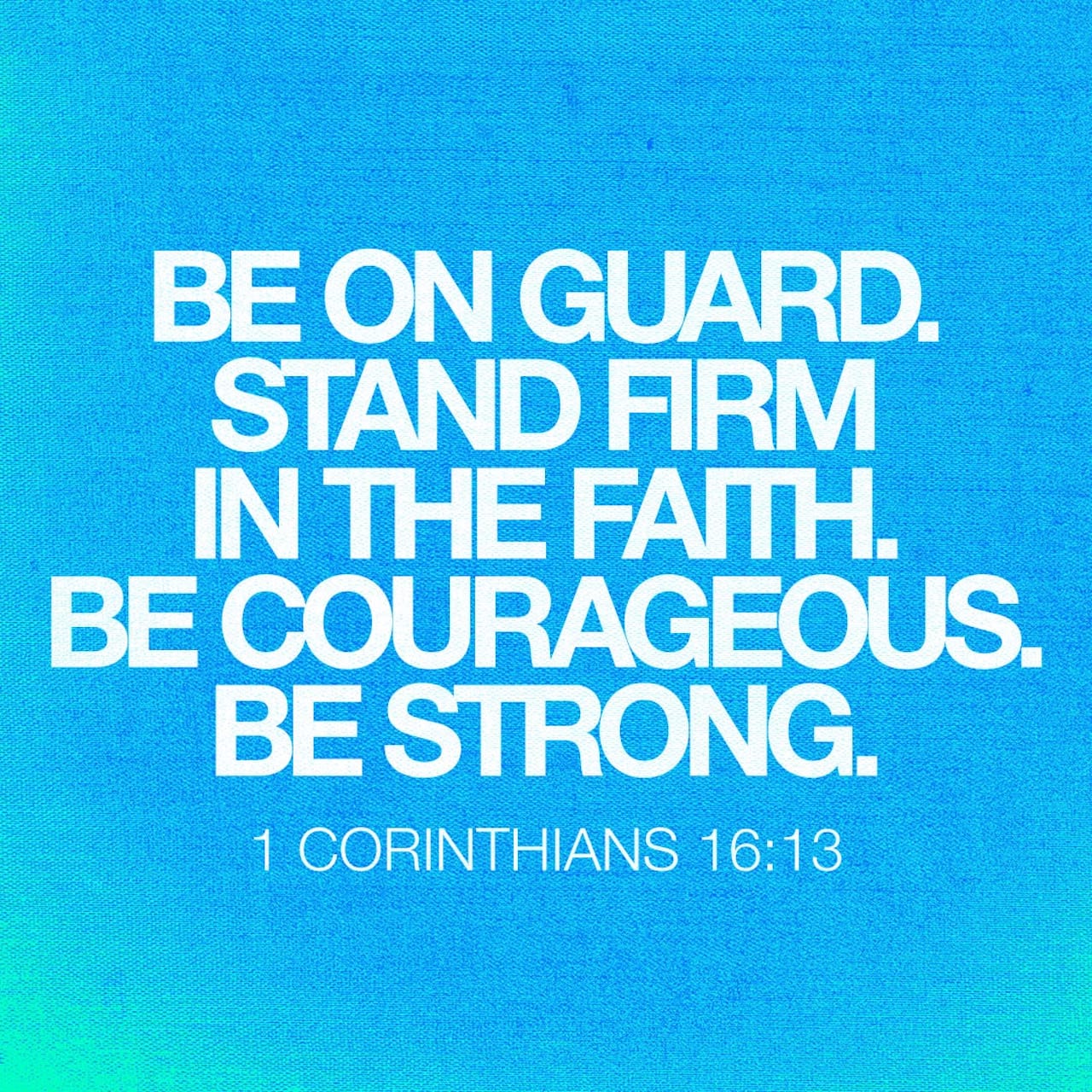
Faith Just Is….

Be on guard; stand firm in the faith; be courageous; be strong. 1 Corinthians 16:13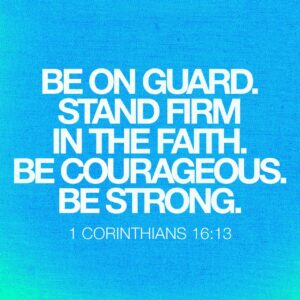
In recent weeks the word faith has popped up in my daily life quite a few times. Pastor Dennis preached a whole sermon about faith and made excellent points for me to ponder. Pastor Sarah touched on faith just this past Sunday, also offering good food for thought. Many of my daily devotional readings have delved into the subject of faith and I felt that maybe I was being nudged to weigh in on the discussion. So here is my take on what I feel is the constant presence of faith.
My sweet and humorous husband has often described faith as buying green bananas at the tender age of eighty. He may have used the word optimism, but you understand the similarity. I would venture that when I see a tiny sparrow chasing a giant grackle in the backyard, that little sparrow must have lots of faith in its ability to steer the much larger bird away for its nest of babies. And those pesky squirrels bury acorns all over our yard each fall in faith that they will be there mid-winter when pickings are otherwise slim. The animal world seems to have an uncanny sense that provision will be there when they need it. Of course, science calls it instinct, but I really believe we could learn a thing or two from the other creatures God made to populate the earth.
We tend to think that faith is something we can’t see or feel or touch or taste, but I would disagree. We see it in His creation, from majestic snowcapped mountains to valleys bursting with crops. We feel it in the sunshine, wind, and rain. We touch it when we hold a newborn child. We taste it in the salt carried on a sea breeze, the sweetness of a fresh strawberry, or a thousand others of God’s amazing delicacies. Faith enfolds us as a warm quilt on a winter’s night. As I see it, faith does not come from us. God is the very essence of faith. He created us in His image and He provided for us from the very beginning of humankind. He still provides today. His faith in us continues, even when the mountain before us seems too formidable to climb, even when the valley of despair looms heavy on our hearts and, yes, even when earthly success worms its way into our very souls and whispers thoughts of sinful human desires. It is when things are going well that the faith God plants in us often has difficulty taking root and growing. It is then that we must listen well.
 So faith comes from hearing, that is, hearing the Good News about Christ. Romans 10:17
So faith comes from hearing, that is, hearing the Good News about Christ. Romans 10:17
Please read aloud the second portion of the opening verse; stand firm in the faith. God doesn’t infer that faith is something we possess but rather He emphasizes the faith He has in us, the faith He established. Our challenge is to grab onto it and hold on tightly, to nurture it and grow it until we and He are one.
How do we do that you ask? We do it by immersing ourselves in His word, by conversing with Him companionably throughout our day, by treating those around us as we would wish to be treated, by overcoming our fear of trying something new or reaching across an imaginary line we’ve never crossed before, maybe to a place outside of our comfort zone. God has faith that we can complete the tasks He sets before us. Why shouldn’t we trust Him?
So then, just as you received Christ Jesus as Lord, continue to live in Him, rooted and built up in Him, strengthened in the faith. Colossians 2:6-7a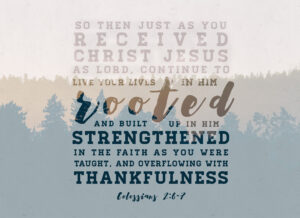
And there it is again, that phrase, “the faith”. It surrounds us always, it is a gift of immeasurable proportion, one that can only come from God and one that is showered upon His children. So I end with the same phrase as my title, Faith just is….and it always was, because God always was and God is faithful! Are you ready to open the gift and accept the challenge, to start building on that faith with which he surrounds you?
For by grace you have been saved through faith. And this is not your own doing, it is the gift of God. Ephesians 2:8
Read more...

Tear Down Those Walls

In so many ways we are separated from each other by walls we have built….
 A couple of weeks ago, we embarked on the task of creating a border around our primary landscape bed that outlines the north and east walls of our home. Our location on a corner lot creates high visibility from three directions as the south wall is also in the direct line of sight. That side is our backyard and is not a part of the current project even though some changes may be coming in the fall.
A couple of weeks ago, we embarked on the task of creating a border around our primary landscape bed that outlines the north and east walls of our home. Our location on a corner lot creates high visibility from three directions as the south wall is also in the direct line of sight. That side is our backyard and is not a part of the current project even though some changes may be coming in the fall.
This new border had been debated for the full seven years we’ve lived in the house. I love borders and had them on all sides of our previous home. It, too, was a corner lot with even greater visibility. Ken was not so fond of them because the engineered stones have a rough surface that eats trimmer line very quickly. But after throwing new mulch all over the yard with the trimmer this season, he decided they might not be so bad after all.
Three runs to Lowe’s later for purchasing stones (we had to haul them in our car and be mindful of the weight) and after Ken delivered the stones from the car hatch to the landscape bed, I set about placing and leveling. It took the better part of a week, we’re not kids anymore, but the bed looks lovely. I finally feel it has a finished quality. But the squirrels have other ideas. Any ground that was disturbed and received added dirt, and any of the pots that are scattered throughout the bed are all fair game. Each morning brings new surprises and challenges.
Now obviously, I didn’t expect a four-inch wall to keep those little critters out of our beds. Of course, an eight-foot wall wouldn’t do the trick either. They’d just scale it, do their damage, and exit the same way they entered. Only with a cover over all of it could keep the squirrels at bay. But then no one could see the plants to enjoy them.
….walls of misunderstanding and fear, walls of hatred and injustice…
It occurs to me that walls are often very useful. Walls and a good roof keep us dry when it rains, warm when the snow flies, and provide a safe place to sleep and a gathering space for family and friends. But sometimes we build imaginary walls around ourselves that signal others to just leave us alone, even when we really need the benefit of companionship. And all too often we build invisible walls around our churches, thinking we should maintain the status quo. It wasn’t all that long ago that church was held in family homes, especially in rural areas where folks had to travel long distances to reach a real church building. It was much easier to just gather a few families in each other’s homes. I’m sure the experience was much more personal as well.
Jesus’ ministry was nearly always conducted outdoors. He taught from mountaintops and beside the sea, even from the bow of a boat. There were no walls and everyone was welcome.
 This week, a vote at the Annual Conference of the UMC will likely change the path Aldersgate is traveling. Many things will remain the same, but some will be a little different. I would suggest that we take care not to surround ourselves with walls or boundaries, but instead, fling open our doors, go outside the church building, and go about the mission we accepted at our baptism—making disciples of Christ in this world. The church is not a building. It consists of people who have a heart for helping others. Let’s tear down those walls, make new friends, and use our specific gifts and skills in ways that invite participation in the family of God. Always remember, you may be the only Jesus that some folks will ever see. Make sure they know He loves them too.
This week, a vote at the Annual Conference of the UMC will likely change the path Aldersgate is traveling. Many things will remain the same, but some will be a little different. I would suggest that we take care not to surround ourselves with walls or boundaries, but instead, fling open our doors, go outside the church building, and go about the mission we accepted at our baptism—making disciples of Christ in this world. The church is not a building. It consists of people who have a heart for helping others. Let’s tear down those walls, make new friends, and use our specific gifts and skills in ways that invite participation in the family of God. Always remember, you may be the only Jesus that some folks will ever see. Make sure they know He loves them too.
…Jesus Christ died to demolish the walls that separate us from one another…
The ball is in our court. We need to carefully consider whose we are.
As for me and my squirrel friends, we’ll continue to build and tear down, build and tear down….that’s what squirrels and humans do. And we’ll hope to do it companionably.
(Quotes are from depree.org, Breaking Down the Walls of Separation, Mark D. Roberts.)
Read more...
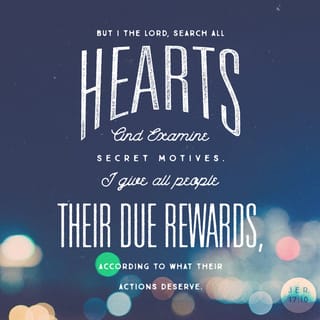
Getting to the Heart of Things

 The heart is hopelessly dark and deceitful, a puzzle that no one can figure out. But I, God, search the heart and examine the mind. I get to the heart of the human…Jeremiah 17: 9-10a
The heart is hopelessly dark and deceitful, a puzzle that no one can figure out. But I, God, search the heart and examine the mind. I get to the heart of the human…Jeremiah 17: 9-10a
The arrival of spring ushered in another new season, the season of garage sales, and that seriously infected Ken with the itch to shop. His recent forays around town and return visits to some of his favorite flea markets have netted him a substantial stash of new (old) tools and the garage workbench is covered in rusty, nasty parts of every size and shape. They are in varying stages of repair and disrepair, many
wrapped in vinegar towels to dissolve years of rusty neglect. He’s constantly applying penetrating oil to soften the rust on a bolt or screw and then toiling over his vise to loosen and remove it from the body of whatever tool he’s working on. Or, with painstaking care, he’s brushing a piece of brass or steel with a soft rotating wire brush to remove the traces of rust still clinging to them after the vinegar bath. I can attest to his persistence because I find tiny wire bristles all over the garage and house, often with my bare feet.
Besides the metal parts that must be cleaned and brushed, there are also wooden pieces that require the removal of grime and finishes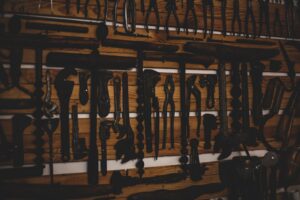 carelessly applied throughout the tool’s life. This must be done only to a level that will maintain the integrity and patina of the piece. He has an uncanny knack for knowing when to quit, even when I don’t agree with his decision. Hours of sanding precede the application of a final finish, usually tung oil, but sometimes other finishes are preferred.
carelessly applied throughout the tool’s life. This must be done only to a level that will maintain the integrity and patina of the piece. He has an uncanny knack for knowing when to quit, even when I don’t agree with his decision. Hours of sanding precede the application of a final finish, usually tung oil, but sometimes other finishes are preferred.
I am constantly amazed that some of the pieces I would view as absolute junk are exactly what Ken is searching for. He looks beyond their obvious flaws and sees a thing of beauty and I’ve learned not to question his judgment. Well, not too much anyway. Some of them seem outrageously impossible even for him to redeem. The thing is, he knows he can get to the heart of the piece and find something worth saving. Our throw-away society doesn’t have the patience or the will to repair. Everyone seems intent on always having the newest, shiniest thing on the market, in the commercial, or on the internet. But there is much to be said for restoration.
 Think where we’d be if God passed by the trash heap where someone has just tossed us, and He did nothing. And trust me, we do get thrown on the trash heap in countless ways. The boss hands us the proverbial pink slip or maybe he fires us through an email. A spouse decides a newer model might be nice. A friend abandons us in a time of need. The kids seem to forget they have a thing called parents. Someone does a little trash-talking that damages our reputation and that can be done anonymously on social media. Sometimes we do things that render us deserving of being thrown on that trash heap and sometimes we just get in the path when somebody starts slinging mud. However it happens, it hurts.
Think where we’d be if God passed by the trash heap where someone has just tossed us, and He did nothing. And trust me, we do get thrown on the trash heap in countless ways. The boss hands us the proverbial pink slip or maybe he fires us through an email. A spouse decides a newer model might be nice. A friend abandons us in a time of need. The kids seem to forget they have a thing called parents. Someone does a little trash-talking that damages our reputation and that can be done anonymously on social media. Sometimes we do things that render us deserving of being thrown on that trash heap and sometimes we just get in the path when somebody starts slinging mud. However it happens, it hurts.
But you know what, God doesn’t leave us on that trash heap because he sees each of us as valuable, he knows there’s a bright and shiny heart somewhere buried beneath all the grime of anger, hatefulness, self-pity, and pain. He can make us just like new again and, just like Ken’s tools, the restored model is often much improved.
Not everyone has a heart for restoring old things, but we can certainly be more resourceful in maintaining what we have. And that applies to our hearts as well. When we try our best to live God’s will, He won’t need to rescue us from the trash heap quite so often and when we show His love to those around us, they may make fewer trips to the heap as well and than our world could be a lot brighter just like those shiny old tools that grace our home.
Create in me a clean heart, O God. Renew a loyal spirit within me. Psalm 51:10
Read more...

Life Is All About Detours

Your word is a lamp to guide my feet and a light for my path. Psalm 119:105 NLT
Last Thursday began as an ordinary day at our house. Ken was washing and waxing the car in recognition of spring. I was tending my perennials as usual and trying to wrap up the digitization of our old photos. I’d been in the yard most of the morning and came in to the sound of Ken’s ringtone but I didn’t make it in time, nor did I recognize the number on the recent call so I ignored it. A couple of minutes later, my phone rang and it was the same caller so I figured it must be someone who knows us and answered. I was surprised and thrilled to hear the voice of a dear friend at the other end of the connection, one we hadn’t seen for a good while. The couple was visiting Branson and enjoying their RV but decided to make a side trip up to our house if we were available. And, of course, we were. They planned to arrive about one thirty to two.
 I was a muddy mess, looking like I just stepped out of a pig pen and Ken was wrapping up the car wax. We had just enough time to clean up and make ourselves presentable. Ken was faster but I finished a few minutes before one thirty so we got comfy and waited. One forty-five passed, then two o’clock and two fifteen. No company arrived at our door. I had jumped on the laptop to check camping availability at one of our favorite parks and discovered an open site so we quickly decided to go for it. In the midst of that, my phone rang and a very frustrated voice on the other end said, “We’re lost!”
I was a muddy mess, looking like I just stepped out of a pig pen and Ken was wrapping up the car wax. We had just enough time to clean up and make ourselves presentable. Ken was faster but I finished a few minutes before one thirty so we got comfy and waited. One forty-five passed, then two o’clock and two fifteen. No company arrived at our door. I had jumped on the laptop to check camping availability at one of our favorite parks and discovered an open site so we quickly decided to go for it. In the midst of that, my phone rang and a very frustrated voice on the other end said, “We’re lost!”
They began to throw out road names that were unfamiliar and I was in the middle of a reservation so I tossed the phone to Ken. He had no idea where they were either when all of a sudden one of them shouted the name Hurley and we both knew exactly where they were. He gave them directions and they arrived at our door at the exact time their navigation system had predicted.
And your ears shall hear a word behind you, saying, This is the way; walk in it, when you turn to the right hand and when you turn to the left. Isaiah 30:21
They didn’t opt for the easiest or best route, 160 north to 14 west, they took the route that was described as “shortest,” apparently one that took them down one-lane roads, over low water crossings which would have been impassable a couple of days earlier, all in the proverbial “middle of nowhere”. They said the road resembled a goat path most of the way. The miracle of this adventure, and I would have to label it a small miracle, was that they had a phone signal when they decided to reach out to us. I believe someone pretty amazing had their backs that day.
took them down one-lane roads, over low water crossings which would have been impassable a couple of days earlier, all in the proverbial “middle of nowhere”. They said the road resembled a goat path most of the way. The miracle of this adventure, and I would have to label it a small miracle, was that they had a phone signal when they decided to reach out to us. I believe someone pretty amazing had their backs that day.
This little misadventure leads me to the conclusion that life is filled with detours, large and small, and all too often the path which seems easier may start us down a very slippery slope. Their goat path may have been the shortest route but the shortest is not always the fastest and certainly not always the best. The upside here is that we had a wonderful visit with dear friends, enjoyed a nice dinner together and they pulled out of the restaurant parking lot in Nixa with time to make it back to their RV before dark if they ignored that little voice in the dash and drove straight down 160 and made a left on 76, which they did.

GPS is a beneficial tool and I don’t leave home without it. But that little voice in the car’s system or your phone can become very obnoxious when it decides it knows more than we believe we do. Likewise, that little voice in our heads often tries to tell us that the road it leads us down is a lot more fun, and when it does, we often have a little itch to travel that road for a while. But who do you turn to when you hit a roadblock or find yourself in a sticky mess? It’s often said that more prayers are uttered when humans find themselves in trouble than at any other time. Maybe the better choice, the next time we find ourselves considering giving in to temptation, would be to thoroughly scrutinize our options before choosing a path. God’s way is certainly not always the easiest or shortest, but it is always the best because He sees the whole picture.
You make known to me the path of life; you will fill me with joy in your presence, with eternal pleasures at your right hand. Psalm 16:11
Read more...

Land of the Sinkhole

Anyone who listens to my teaching and follows it is wise, like a person who builds a house on solid rock. Though the rain comes in torrents and the floodwaters rise and the winds beat against that house, it won’t collapse because it is built on bedrock. But anyone who hears my teaching and doesn’t obey it is foolish, like a person who builds a house on sand. When the rains and floods come and the winds beat against that house, it will collapse with a mighty crash. Matthew 7:24-27 CEB 

Considering the amount of rapidly falling rain we’ve been receiving and the nature of our southwest Missouri topography, it seems an appropriate time to dig a little deeper, if you will, into the phenomenon of the dreaded “sinkhole”. You’ve all heard of them and when we shop for a home in this region, it’s a very good idea to make oneself aware of any sinkholes in our area of choice.
To understand the sinkhole, let’s look to the makeup of our topography, which is known as “Karst,” from the original Kras region on the border between Slovenia and Italy, one of only a few regions in the world, along with our midwestern US, where this phenomenon is found. Its history is very old and exists where uplifts have occurred in the earth’s surface and where there are large deposits of porous limestone or dolomite. As slightly acidic ground water travels around rocks it dissolves the soft stone away and creates a natural drainage system. As the cracks widen, they become small caves with what are referred to as “losing streams” flowing through them. If you happen to be hiking alongside a stream in the Ozarks and it suddenly seems to end, it is likely just disappearing underground into an interconnected system of caves and may eventually emerge again as a spring.
These underground pockets of water can be useful when harnessed by a pump to provide clean water for human consumption. Still, they can also be treacherous if the layers of soil above them become weakened and collapse, and thus the “sinkhole” is formed. Sinkholes may appear anywhere in the Karst regions or our world, in an open field, or near the foundation of a home.
Missouri isn’t known as the “cave state” for no reason. According to the Missouri Department of Conservation, there are some 7,000 caves in our state and, you guessed it, most are south of I-70 and west of the Bootheel. We are unique here in the Ozarks and are known for the beauty of our caves, streams, and springs. Sinkholes are an inevitable part of that system as well.
All this talk of collapsing earth and sinkholes reminds me of the song we sang when I was a child in Sunday School, the one about the foolish man building his house on the sand. The rains came and the winds howled, and that house came tumbling down. On the other hand, the wise man built his house upon the rock and the floods and wind could not destroy his house. Whether we refer to literal houses or spiritual ones, we must survey the terrain we inhabit to be sure it is attached to a firm foundation.
 Many areas of our country have “reclaimed” land from the sea by dredging and building upward. But one thing I’ve learned about water in all the places I have lived is that it will have its own way. Whether you live near the ocean where waves rearrange the sand at your doorstep or inland, where water rushes silently underground creating fissures, then caves that can collapse, we’re all vulnerable to its power. Enough water, the right amount of time, directed toward a specific target can decimate anything man can build. But, in God’s hands, a single word can silence a torrent.
Many areas of our country have “reclaimed” land from the sea by dredging and building upward. But one thing I’ve learned about water in all the places I have lived is that it will have its own way. Whether you live near the ocean where waves rearrange the sand at your doorstep or inland, where water rushes silently underground creating fissures, then caves that can collapse, we’re all vulnerable to its power. Enough water, the right amount of time, directed toward a specific target can decimate anything man can build. But, in God’s hands, a single word can silence a torrent.
So….where did you say you want to build your house?
Read more...
One Misplaced Wallet
On a recent day trip to Branson intended for relaxation, we’d experienced a number of ups and downs, more downs than ups. As we headed toward Branson West, Ken realized we needed gas and prices had been better than usual in the tourist town, so we decided to stop at Walmart. We pulled up to the pump and Ken filled the tank then got a message that there was no paper to print his receipt. Making his way to the cashier’s window, he spotted a wallet lying on the pavement. He showed it to the attendant who immediately insisted that he hand the wallet over and because of the person’s attitude Ken was reluctant to do that.
 I heard a loud discussion behind the car but didn’t know what was happening until Ken hopped into the car and left the station. The story unfolded as we drove over to the store parking lot where he promptly called 911 to report the wallet, not exactly the purpose of 911, but we didn’t want to take the wallet home and, after some discussion, decided that would be the quickest way for the owner to be contacted and reunited with his belongings.
I heard a loud discussion behind the car but didn’t know what was happening until Ken hopped into the car and left the station. The story unfolded as we drove over to the store parking lot where he promptly called 911 to report the wallet, not exactly the purpose of 911, but we didn’t want to take the wallet home and, after some discussion, decided that would be the quickest way for the owner to be contacted and reunited with his belongings.
That had been a difficult decision for Ken because of a negative experience from his childhood. It seems he found a lost or discarded bike and took it to the local police station. An officer accepted it with what seemed to Ken a little too much enthusiasm. Ken asked what would happen to the bike and the officer told him it would stay there for thirty days and, if no one claimed it, Ken could have the bike if he wanted. He was very excited by the prospect of happening onto a very nice bike that could be his in just a month. He counted down the days and went back to the station to inquire about the bike. The officers on duty told him that they were sorry, but someone had claimed it. However, something in their attitude convinced Ken that one of them had taken it home to a child of their own. Since that day, he vowed that when or if he found something of value, he would find a way to return it on his own and he’d been successful up to that point.
Back to our story….the dispatcher had said that there was an officer in the area and they agreed that we would meet in front of Walmart. Ken waited there while I picked up a few needed items and the officer arrived just as I had checked out. We turned over the wallet and all its contents, asking the officer to please locate the owner as quickly as possible because he would undoubtedly be concerned about credit cards, driver’s license, and any other personal items contained within the wallet. We said our thanks for his prompt and professional response and headed up 160 to Nixa and on to our home. As we drove, I whispered a prayer that the wallet and its owner would be reunited and there would be no negative repercussions for anyone .
.
Later that evening, as we were watching TV, a stranger called saying he had just picked up his wallet and heard the story of how it was handled. It turned out he carried an employee ID for Silver Dollar City and when the officer explained to them what had happened, they graciously provided a contact number for the man. He told Ken that after leaving the gas station, he’d gone to a fast-food restaurant for a snack and found himself without his wallet. Upon his return to the station, the attendant told him some guy had taken it and that he would never see it again. Well, he was wrong. Our new friend had retrieved his wallet inside of two hours because of the efforts of my sweet husband and an honorable police officer. His heartfelt thanks were offered to Ken and everyone’s day ended on a high note. (And maybe Ken’s confidence in the integrity of our law enforcement officers got a little boost in the process.)
I firmly believe that God had his hand on that whole situation. He prompted Ken to look at his gas gauge just as we were approaching Walmart. The machine ran out of paper just when Ken arrived on the scene, making him walk to the window, where he spotted the wallet. He was prompted by past memories to follow his conscience but also to seek help through reliable authorities and to impress upon them how distraught the man would be at this loss. The officer who responded was a true professional and carried through with the effort to locate the man and all of us were watched over as we worked to accomplish a common goal, to take care of our neighbor.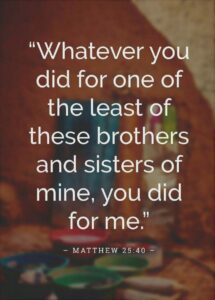
It seems like a simple story but, to one man, it meant a lot. We’ll likely never have contact with him again, but on that afternoon, God brought several people together to guarantee a good outcome. His plan is always best and we need to always remember to turn to Him first.
Truly I tell you, whatever you did for one of the least of these brothers and sisters of mine,
you did it for me. Matthew 25:40 NIV
Read more...

